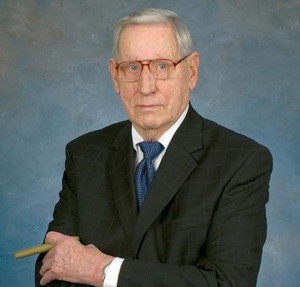
Jim Harbour taught the auto industry that lean manufacturing could boost profits and customer satisfaction.
He was blunt to the point of curmudgeonly, and had little time for excuses. At times, that made him something of an industry pariah, but by the time he retired, James E. Harbour had become one of the most influential analysts in the auto industry.
His annual Harbour Report had become something of a bible for automakers looking to find ways to squeeze more production out of their factories while reducing bloated headcounts. In its early years, the study revealed just how badly Detroit’s automakers had fallen behind their import competition. But it later showed just how rapidly the so-called Big Three were catching up – and, in some cases, taking the lead.
Harbour, who continued to follow the industry long after most executives head off to play golf or fish, passed away Saturday at the age of 86. But his pioneering concepts are likely to continue having a strong impact on the industry he spent his life following.
“Jim Harbour was a visionary when it came to manufacturing productivity,” General Motor Chief Executive Mary Barra said in a statement. “He drove all of us to new heights of efficiency. Jim’s knowledge and passion for the manufacturing arena made the entire industry better, and by so doing, brought higher levels of product safety and quality to customers worldwide.”
Those who have watched the evolution of the auto industry suggest that Jim Harbour was one of the most influential observers since World War II, among a handful of consultants, such as Dr. W. Edwards Demming, who helped introduce the concept of lean manufacturing.
(Cadillac to offer nearly autonomous vehicle in 2017. Click Here for the full story.)
Though born in New Hampshire, Jim Harbour seemed destined to work in the auto industry as the son of a Ford tool and die maker. After serving in the U.S. Navy, he got a bachelor’s degree from Detroit’s Wayne State University, soon landing a job as a financial analyst at Ford Motor Co.’s old Highland Park plant in 1954. Three years later, he was hired by Chrysler.
It was a time when the “bean counters,” the financial analysts, dominated the executive suites in the Motor City. But with little foreign competition, history shows they didn’t do a very good job of keeping costs under control. Pressure from the unions didn’t help, but as Harbour became increasingly aware, the real problem was management itself. The carmakers were designing vehicles that required a lot of labor to produce, often with shoddy quality.
In 1980, Harbour struck out on his own, forming the consulting firm Harbour and Associates. His message was simple: the auto industry needed to put a greater focus on productivity. But the sub-text was equally important: greater productivity not only meant higher profits but also translated into customer-pleasing quality.
In the early years, Harbour’s studies – and the increasingly well-publicized Harbour Report – generated deep animosity within the Motor City, though it was better received by the Asian imports that dominated its results. But slowly, domestic manufacturers began to recognize the potential payoff. And, by the time the then 71-year-old Harbour officially retired in 1999, Detroit’s makers were showing major gains, even beginning to beat some of the seemingly unstoppable Japanese brands.
(Swedish automaker faces smallest recall ever. Click Here for the story.)
Though two of his children picked up where Jim Harbour left off, the consultant continued to remain active. In 2006, he and Laurie Harbour published a critical study, “Automotive Competitive Challenge: Going Beyond Lean.” It documented the challenges Detroit makers faced and was particularly well-timed with the industry about to plunge into its worst downturn since the Great Depression.
In 2009, Harbour followed with “Factory Man,” a book that revealed how he became aware of Toyota’s game-changing approach to productivity.
“In addition to having a profound effect on the automotive and manufacturing industries, Jim was a devoted family man,” noted his son Ron Harbour, who continued the consultancy after his father retired. Jim’s wife, Dolores, passed away in 2012. They together raised eight children, many of whom have continued in the automotive industry.

TPS (Toyota Production System) I and II are great; too bad many manufacturers thought they could jsut cherry-pick the system to gain quality, production and productivity. All who did this failed miserably. They didn’t understand the key word, “SYSTEM”.